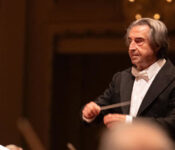Review: Officially, conductor Riccardo Muti holds the distinction of music director emeritus for life with the Chicago Symphony Orchestra. But after the 83-year-old maestro’s two-week season debut concerts at Orchestra Hall, it seems more apt to acknowledge him as the band’s artistic patriarch. When Muti’s on the podium, the CSO rises to its proper level. It glistens.
Read the full story »Premiere of Mantovani’s eclectic ‘Threnos’ accents CSO memorial fare with Marin Alsop
![Premiere of Mantovani’s eclectic ‘Threnos’ accents CSO memorial fare with Marin Alsop 10/18/18 8:20:39 PM
Chicago Symphony Orchestra
Marin Alsop conductor
Daniil Trifonov piano
Bruno Mantovani composer
Mantovani Threnos [World Premiere, CSO Commission]
Prokofiev Piano Concerto No. 3
Bridge Lament
Copland Symphony No. 3
© Todd Rosenberg Photography 2018](https://chicagoontheaisle.com/wp-content/uploads/2018/10/CSO181018_137-feature-sub-Todd-Rosenberg-255x230.jpg)
Review: Years, anniversaries, and commemorations arguably form the backbone of contemporary classical concert programming, and this year’s centenary of the end of the First World War is exemplary. Conductor Marin Alsop’s program with the Chicago Symphony Orchestra on Oct. 19 at Orchestra Hall featured works by American, Russian, and British musicians written in response to the First and Second World Wars and their aftermath, plus a major world premiere from the French composer Bruno Mantovani, commissioned by the CSO and Jennifer Pritzker, founder of Chicago’s Pritzker Military Museum & Library.
‘Idomeneo’ at Lyric Opera: Strike gives way to stellar Mozart and new reign of euphoria
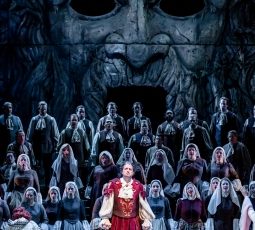
Review: Neptune scowled, but grand opera is back on the boards at the Lyric Opera House, and you could all but taste relief in the torrent of applause as the curtain went up on the season’s first post-strike performance of Mozart’s early masterpiece “Idomeneo.” Jean-Pierre Ponelle’s iconic production greeted the crowd. ★★★★
In annual report, CSO notes high renewal rate for subscribers and popularity of film concerts
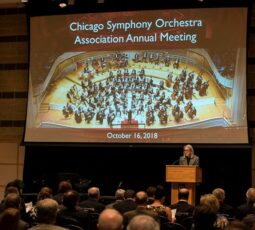
This Just In: The following is a news release written by an arts organization, submitted to and edited by Chicago On the Aisle.
The Chicago Symphony Orchestra Association (CSOA) released the results of fiscal year 2018 …
Strike settled, Lyric Opera set to raise curtain on Mozart’s ‘Idomeneo’ and Part 3 of ‘Ring’
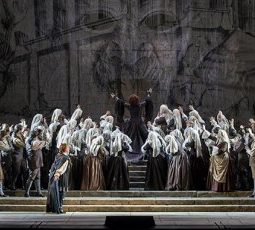
Report: After the brief, harrowing intermission of a strike by its orchestra, the Lyric Opera of Chicago is back in business. Members of the Chicago Federation of Musicians ratified a new contract Oct. 14, ending a five-day walkout and clearing the way for the Lyric to declare Oct. 18 as the deferred opening night of Mozart’s “Idomeneo.” The Lyric Opera House actually re-opens its doors Oct. 17 with a performance of Puccini’s “La bohème,” which launched the current season.
Lyric Opera, striking orchestra reach accord, ending walkout; musicians ratify agreement

Update: Lyric Opera of Chicago and the Chicago Federation of Musicians Local #10-208 (CFM) have reached a multi-year labor agreement extending through the 2020/21 season. On Oct. 14, the Chicago Federation of Musicians voted to ratify the tentative agreement reached one day earlier. No further details or comments were available. The musicians went on strike Oct. 9 in response to cuts in compensation and work weeks sought by management.
Orozco-Estrada leads CSO through nature’s realm in pageant of Mahler Third Symphony
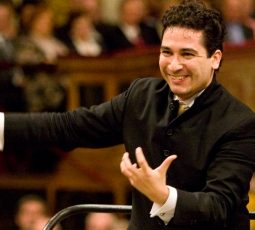
Review: While the sounds of birds chirping and animals flitting can be heard in the Symphony No. 3 in D minor, the work is much more than a mere evocation of an idyll. Indeed, the composer takes listeners on an extraordinary musical, philosophical and auto-biographical journey. Colombian-born Andrés Orozco-Estrada guided the Chicago Symphony in a performance that captured the full richness, variety and scope of Mahler’s odyssey.
Healthy and ambitious, Joffrey Ballet plans epic storytelling as core of 2018-19 season
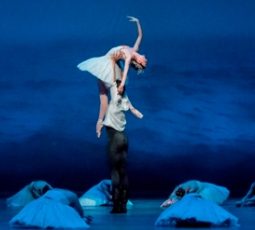
Preview: Three grand narratives headline the Joffrey’s new season opening October 17 at the Auditorium Theatre: Remounts of Christopher Wheeldon’s ingenious ballet-within-a-ballet version of “Swan Lake” and his Chicago-oriented “Nutcracker,” plus the world premiere of Tolstoy’s “Anna Karenina” choreographed by fellow Russian Yuri Possokhov.
‘La bohème’ at Lyric Opera: Splendid voices, squandered in an unsentimental tool shed
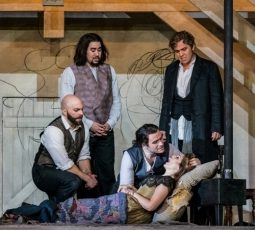
Review: Despite a superior musical performance by a fine international cast, and firmly idiomatic orchestral playing and choral work from the promising Venezuelan-Swiss conductor Domingo Hindoyan, in his Lyric debut, the new-to-Chicago “La bohème” by director Richard Jones is a major letdown, a misconceived case of too much here and too little there.★★★
New Mazzoli cycle sparkles amid vocal gems as Collaborative Arts honors the art of song
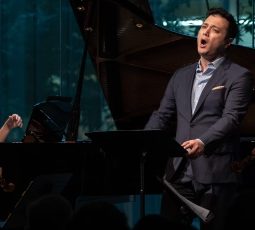
Review: The Collaborative Arts Institute of Chicago is on a mission. Now in its ninth season, the Institute has dedicated its considerable energy to the preservation of art song as a germane form for contemporary audiences. The Institute kicked off its 2018 Collaborative Works Festival on Sept. 5 with diverse repertoire that included the Midwest premiere of Missy Mazzoli’s new cycle “Songs from the Operas.” Next up, on Oct. 28, the Institute will observe the 100th anniversary of Armistice Day with Mahler’s “Des Knaben Wunderhorn.”
With CSO blazing, Riccardo Muti brings back Hindemith masterpiece ‘Mathis der Maler’

Review: After an absence of more than 20 years from the Chicago Symphony Orchestra repertoire, Muti and the CSO have brought back Hindemith’s magnum opus in a brilliant, deeply considered performance. French pianist David Fray was the cool, unconvincing soloist in Beethoven’s Third Piano Concerto.
Opulence of ‘Scheherazade,’ Mozart writ large: Who can resist sound of Muti’s Chicago band?
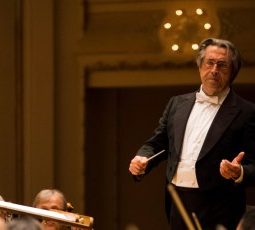
Review: Music director Riccardo Muti’s second week of concerts with the Chicago Symphony Orchestra was notably conservative – Mozart’s Overture to “Don Giovanni” and his Symphony No. 40 in G minor, together with Rimsky-Korsakov’s “Scheherazade” – but even curmudgeonly critics had to acknowledge the consistently high level of performance the maestro drew from his remarkable ensemble in a program Sept. 27 at a packed and enthusiastic Orchestra Hall.
‘Curve of Departure’ at Northlight Theatre: Nussbaum at 94, etching old age with mastery

Review: Actor Mike Nussbaum will turn 95 in December (no, that is not a typo), and he is now delivering such a towering performance in the Northlight Theatre production of Rachel Bonds’ play, “Curve of Departure,” that you might easily be persuaded he is simply a supremely talented actor impersonating an old man.★★★
Muti, CSO open with Shostakovich monument ‘Babi Yar’; composer’s widow attends concert
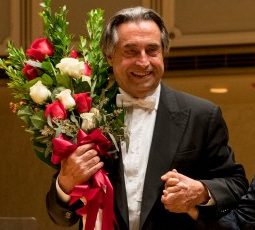
Review: Music director Riccardo Muti and the Chicago Symphony Orchestra opened their 2018-19 season Sept. 21 with an eloquent and gripping performance of Shostakovich’s Symphony No. 13 (“Babi Yar”) on verses of Yevgeny Yevtushenko memorializing the massacre of Jews by German soldiers near Kiev in 1941. The composer’s widow, Irina Shostakovich, joined Muti on stage at Orchestra Hall for a post-performance conversation.
Theater 2018-19: In three philosophical plays, Shattered Globe probes issues intimate, epic

Fifth in a series of season previews: It’s easy to pick five shows for a season, says Shattered Globe Theater artistic director Sandy Shinner. But settling on just three plays, which is a full plate for this plucky little company: That, says Shinner, is tricky. The trio of plays in view at Shattered Globe this season bears a collective stamp of philosophical discourse in dramatic form.
Theater 2018-19: Redtwist celebrates 15th year by raising monument in tiny space: ‘King Lear’
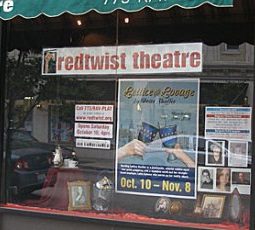
Fourth in a series of season previews: Fifteen years into its venture of creating high-voltage drama in a really small space, Redtwist Theatre will roll out its first production ever by the Bard of Avon. And what else would you choose for a first leap into Shakespeare on a postage-stamp stage but “King Lear”?
Theater 2018-19: Court maps world premiere and last play in the Wilson cycle: ‘Radio Golf’
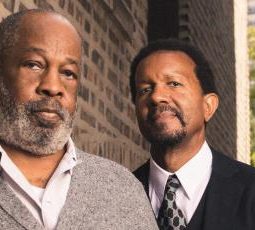
Third in a series of season previews: Court Theatre will cap its 64th season – and artistic director Charles Newell’s 24th year at the helm — with the world premiere adaptation of Saul Bellow’s novel “The Adventures of Augie March,” and kick it off with August Wilson’s “Radio Golf,” the tenth and final installment in his chronicle of the African American experience.
Theater 2018-19: TimeLine cues four dramas, collaborates with feminist venture Firebrand

Second in a series of season previews: TimeLine Theatre launches its 22nd season from the company’s familiar, Janus-faced perspective on historical events: seeing human events of the past in the mirror of the continuing present. “We are, first and foremost, theater makers,” says artistic director PJ Powers. “But we use the lens of history to provide social context.” TimeLine opens its season with Barbara Lebow’s post-Holocaust drama “A Shayna Maidel.”
Theater 2018-19: Getting a real sense of home, Writers plans far-ranging season in new house

First in a series of season previews: Michael Halberstam, founding artistic director of the 27-year-old Writers Theatre, looks back on the company’s first two full seasons in its new Glencoe home as “a very exciting journey, and with this season we feel we’ve really found the right mix for both of our versatile spaces.”
‘Exit the King’ at American Players Theatre: Why would an absolute ruler accede to death?

Review: Eugêne Ionesco’s play about dying, “Exit the King,” generally comes under the rubric of absurdist drama. But that tag doesn’t really fit the play. If a label is required, perhaps “figurative” – certainly, existential. An absorbing and quite affecting account at American Players Theatre rings with truth about that juncture in life where few arrive gladly: its end. ★★★★
‘As You Like It’ at American Players Theatre: Romp in the woods with the Bard, and a twist

Review: It’s a trifecta for women, two in traditional roles and another in a first for me: Shakespeare’s “As You Like It” at American Players Theatre in Spring Green, Wis. Melisa Pereyra and Andrea San Miguel portray BFF Rosalind and Celia – and, in a stunning gender shift, Tracy Michelle Arnold appears as the cynical philosopher Jaques. ★★★★
Role Playing: Zachary Stevenson elevated his Buddy Holly from hiccups to the rockin’ truth

Interview: Zachary Stevenson slips into the persona of Buddy Holly like the early rocker’s doppelgänger in American Blues Theatre’s extended run of the musical “Buddy: The Buddy Holly Story,” by Alan Janes. Stevenson says he feels that identity – now. But back when he first landed the part, more than a decade and some 12 productions ago in Toronto, it was a different story.
‘Linda’ at Steep: When the craggy face of time turns its glare on one-time woman of the year

Review: Despite a rather heavy application of angst, the true face of poignancy emerges in Penelope Skinner’s “Linda,” a dramatic screed at Steep Theatre on women, beauty and the cumulative unkindness of years. Kendra Thulin reels through the title role, one moment a confident and successful marketer of beauty products, the next moment a has-been who watches the world, fashion and relevance all pass by, leaving her bereft in life’s seventh age, sans everything. ★★★
‘Pamplona’ at Goodman: Gray lion Hemingway contemplates life, mischance and le mot juste

Review: Ernest Hemingway was, in flesh and blood, a man’s man, the willful and danger-defiant sort we associate with the fantastical, celluloid John Wayne. He also shared a trait in common with many another towering artist: For all his exterior magnificence, he was troubled, depressive, vulnerable. It’s the compleat Hemingway, fierce and brilliant, tormented and alcoholic, that playwright Jim McGrath attempts to sketch and actor Stacy Keach embodies in “Pamplona,” now on display at Goodman Theatre. ★★
‘Heartbreak Hotel’ at Broadway Playhouse: Elvis at hello, stirred but hardly all shook up

Review: At age 19, an unknown Elvis Aaron Presley walked into Sam Phillips’ recording studio in Memphis and uttered the legendary words that really should be his epitaph. Asked who he sounded like, he replied: “I don’t sound like nobody.” Neither does Eddie Clendening, star of the Elvis bio musical “Heartbreak Hotel” at the Broadway Playhouse, sound like nobody (the double negative is au courant, so it’s cool). Time may have been when Clendening’s voice resembled Elvis’ – back when he played him as part of the “Million Dollar Quartet” at Goodman Theatre in 2008. I never saw that production. But here we are, a decade later. ★
CHICAGO WINE JOURNAL: Summer’s heat means refreshing rosés and light whites

Tasting Report: The dog days are upon us. Time to lap up some cooling summer wines – whites and rosés to accompany a picnic or simply to enjoy, to sip for their own mellow rewards. If there is a place in the wine world that prides itself on rosé, it is Provence, where the cuisine and the warming sun of France’s Southern Rhône Valley create an ideal setting for these salmon-pale refreshers.
‘Support Group for Men’ at Goodman: 4 guys, make it 5, couple of cops and a ‘talking stick’
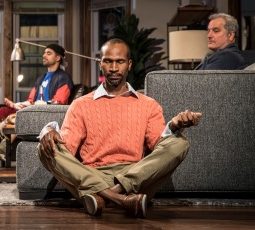
Review: The first flourish of Ellen Fairey’s play “Support Group for Men,” now on display at Goodman Theatre, works twofold narrative magic: It creates a deceptively rich context, and it’s just plain deceptive. We think we’re in for a night with the boys as sitcom when the truth is we’re in for a theatrical ride as clever as it is gentle and poignant and authentic. ★★★★
‘The Roommate’ at Steppenwolf: Couple’s odd but the joke’s over when punchline goes dark

Review: Surely the first thing that will come to mind for many viewers in the opening scene of Jen Silverman’s play “The Roommate” at Steppenwolf Theatre is “The Odd Couple” – recreated here for two middle-aged women. Sharon is a dowdy Iowa mom living alone who takes in worldly New Yorker Robyn, who’s looking to get away from it all for a while. But “The Odd Couple” it is not. Silverman’s drama is ultimately tragic, and desperately sad. ★★★
Conductor uncorks a Bolcom birthday toast, and pours dark, bracing Fifth of Tchaikovsky

Review: The rewards just keep coming at this summer’s Grant Park Music Festival. After a splendid opening stint of concerts, artistic director Carlos Kalmar gave place to conductor Dennis Russell Davies on July 6, and the result was yet another stellar program – this one offering an 80th birthday tribute to composer William Bolcom with his Fourth Symphony as well as a potently dramatic take on Tchaikovsky’s Fifth Symphony.
Summer roll: Conductor Carlos Kalmar leads Grant Park Orchestra in a festival of delights

Review: The Grant Park Festival Orchestra’s June 27 concert at Millennium Park, under the baton of music director Carlos Kalmar and featuring London Symphony principal flute Adam Walker, offered an exemplary instance of Kalmar’s wide-ranging command of musical periods and styles. In music requiring great ensemble finesse, understatement and transparency, Kalmar’s disciplined orchestra delivered on all counts.
In single soft flourish of Rossini ‘Stabat Mater,’ Muti effect tells in Chicago Symphony, Chorus
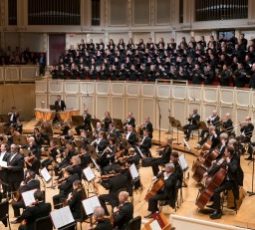
Review: If there was a moment during the season-ending concert that summed up the singular achievement of the Chicago Symphony Orchestra and Chorus under the long-term influence of Riccardo Muti, it came near the end of Rossini’s “Stabat Mater,” a Catholic hymn to Mary that pulls the listeners into the mother’s grief at the foot of the cross and offers transcendence. The three-line prayer “Quando corpus morietur” (“When my body dies, let me live in Paradise, too”) is so very human and humble that the listener might not notice how treacherous it is to sing. The Chicago Symphony Chorus imbued it with a powerful emotion that filled the hall, yet with sound so soft it barely hung on a thread.
Recent Posts
- In concerts brilliant and grand, Muti showed
why he still waves magic wand over the CSO - CSO finale’s convergence of three young stars signaled new energy heading into Mäkelä era
- Mäkelä, CSO’s maestro-elect, shows his chops with baton and bow in Oslo orchestra concerts
- Haymarket Opera closes out its spring season with early Handel oratorio ‘La Resurrezione’
- In concerto ‘The Elements,’ CSO and violinist mined the potential of composer partnerships
Most Commented
- Role Playing: Janet Ulrich Brooks on nailing the style of a wily Russian in 'A Walk in the Woods'
- Role Playing: City boy Michael Stegall ropes wild cowboy in Raven Theatre’s ‘Bus Stop’
- Role Playing: Sadieh Rifai zips among seven characters in one-woman ‘Amish Project’
- Role Playing: Kirsten Fitzgerald inhabits sorrow, surfs the laughs in ‘Clybourne Park’
- Role Playing: Brent Barrett’s glad he joined ‘Follies’ as that womanizing, empty cad Ben

